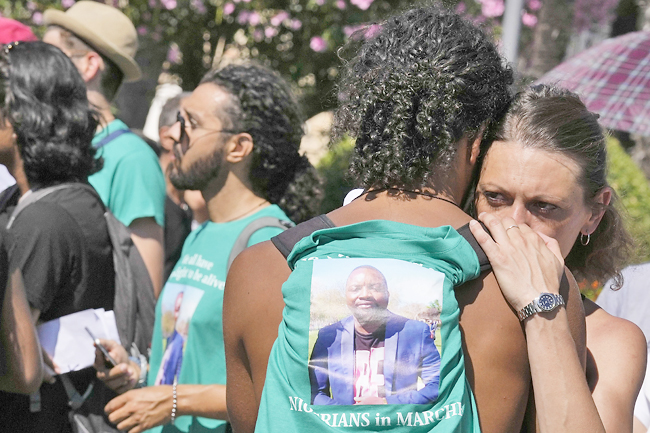CIVITANOVA MARCHE, ITALY (AP) – Two marches on Saturday in a well-to-do Italian Adriatic beach town both sought justice in the brutal daylight killing of a Nigerian man at the hands of an Italian stranger but were divided by one word: Racism.
One march by Nigerians living in Italy’s Macerata province was led by victim Alika Ogorchukwu’s tearful widow and joined by two of his brothers. Organisers of that march said they did not want the search for justice to be clouded by accusations of racism that they feel cannot be proven.
The second march, along same route an hour later, was led by Black Italians from all over
Italy who demanded that Italian authorities reverse themselves and recognise the role that race played in the July 29 killing.
“Not naming racism won’t help us understand how to defeat it. Because racism exists in Italy,” Selam Tesfaye, a Milan-based immigrant activist, told the second crowd of about 100 people. “If someone in Civitanova wants to explain why this is not racism, we are here.”
A widely circulated video shows the Italian man wrestling Ogorchukwu to the ground and strangling him. One man’s voice can be heard shouting for the attacker to stop, but no onlookers intervened physically, adding a layer of public outrage over their apparent indifference.
Police arrested an Italian suspect, Filippo Ferlazzo, 32, but quickly ruled out a racial motivation for the attack. The finding was confirmed by prosecutors who did not include racial motivation in the charge sheet, according to Ferlazzo’s lawyer, Roberta Bizzarri.
According to police, Ferlazzo first struck Ogorchukwu with a crutch the vendor used after pursuing the Nigerian 200 metres down a shopping street lined with high-end boutiques.
Some accounts said Ogorchukwu had complimented Ferlazzo’s companion while trying to make a sale or ask for spare change. Others said he had touched the companion’s arm.
Townspeople have accepted the official version of events, attributing the Nigerian man’s death to an insistent street-seller unfortunately clashing with a man who has a court-documented history of mental illness.




















































